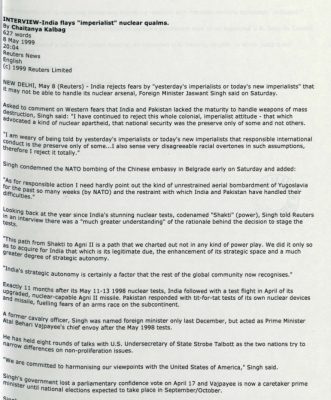Interview- India flays “imperialist” nuclear qualms
[Reuters]
Published date: 8th May 1999
8 May 1999
Reuters News
English
(c) 1999 Reuters Limited
NEW DELHI, May 8 (Reuters) – India rejects fears by “yesterday’s imperialists or today’s new imperialists” that It may not be able to handle its nuclear arsenal, Foreign Minister Jaswant Singh said on Saturday.
Asked to comment on Western fears that India and Pakistan lacked the maturity to handle weapons of mass destruction, Singh said: “I have continued to reject this whole colonial, Imperialist attitude – that which advocated a kind of nuclear apartheid, that national security was the preserve only of some and not others.
“I am weary of being told by yesterday’s imperialists or today’s new imperialists that responsible international conduct is the preserve only of some … I also sense very disagreeable racial overtones in such assumptions, therefore I reject it totally.”
Singh condemned the NATO bombing of the Chinese embassy in Belgrade early on Saturday and added:
As for responsible action I need hardly point out the kind of unrestrained aerial bombardment of Yugoslavia for the past so many weeks (by NATO) and the restraint with which India and Pakistan have handled their difficulties.”
Looking back at the year since India’s stunning nuclear tests, codenamed “Shakti” (power), Singh told Reuters in an interview there was a “much greater understanding” of the rationale behind the decision to stage the tests.
This path from Shakti to Agni II is a path that we charted out not in any kind of power play. We did it only so as to acquire for India that which is its legitimate due, the enhancement of its strategic space and a much greater degree of strategic autonomy.
“India’s strategic autonomy is certainly a factor that the rest of the global community now recognises.”
Exactly 11 months after its May 11-13 1998 nuclear tests, India followed with a test flight in April of its
upgraded, nuclear-capable Agni II missile. Pakistan responded with tit-for-tat tests of its own nuclear devices and missile, fuelling fears of an arms race on the subcontinent.
A former cavalry officer, Singh was named foreign minister only last December, but acted as Prime Minister Atal Behari Vajpayee’s chief envoy after the May 1998 tests.
He has held eight rounds of talks with U.S. Undersecretary of State Strobe Talbott as the two nations try to “We are committed to harmonising our viewpoints with the United States of America,” Singh said.
Singh’s government lost a parliamentary confidence vote on April 17 and Vajpayee is now a caretaker prime minister until national elections expected to take place in September/October.
Singh said the next round of talks with Talbott, planned for June, had been put on hold. “But these have been with the United States the longest lasting and I do believe the most productive rounds of talks that have been held in the last many decades.”
he said India, which declared a moratorium on further nuclear testing after May 1998, would not be able to take any policy initiatives on the Comprehensive Test Ban Treaty because of the impending election.
But he said New Delhi would never subscribe to the Nuclear Non-Proliferation Treaty (NPT). “NPT is a no-entry zone. Our position on NPT Is clear – India will not subscribe to the NPT because we find it discriminatory.”
Singh said India was also committed to continuing its dialogue with Pakistan.
“Our commitment to resolving issues and improving relations with Pakistan remains completely undiluted.”
Singh also underlined India’s determination to pursue a permanent seat on an expanded U.N. Security Council.
“I cannot visualise a reformed United Nations, an expanded U.N. Security Council, In which India is not
represented.”






